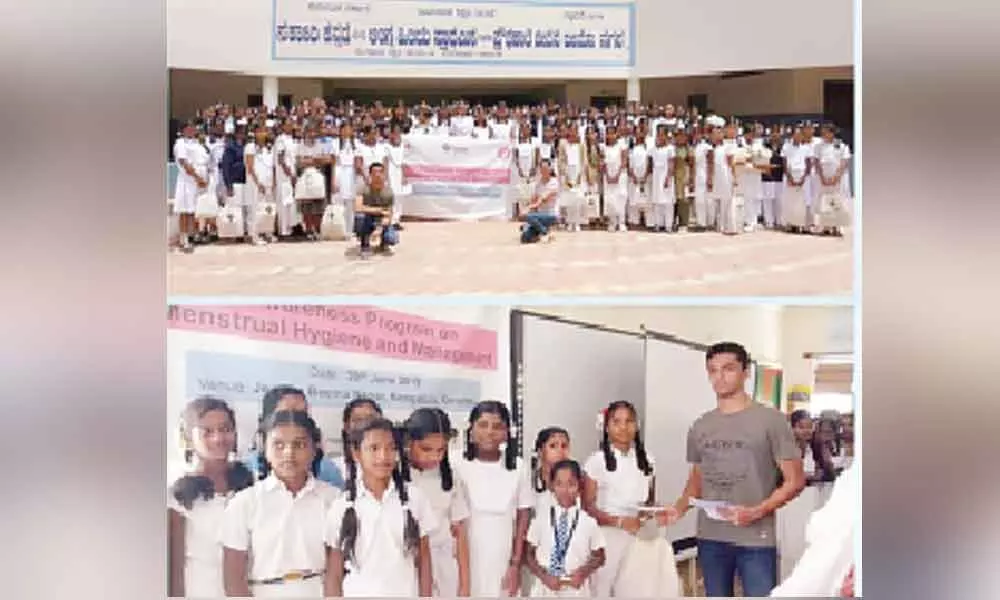Empowering girls through better menstrual hygiene

Hyderabad: There is a lot of misinformation prevalent in the society with respect to menstruation. Menstrual Hygiene Management (MHM) is an essential health topic which is rarely spoken about or discussed both at schools or homes.
70 per cent of girls miss school each month during menstruation thus missing out on important lessons taught. As many as 25 per cent of girls drop out of school after attaining puberty due to the stigma and misconceptions associated with menstruation. There is a 70 per cent increase in reproductive tract infections owing to poor menstrual hygiene.
Some of the girls are banished from their homes and forced to live in a secluded menstrual hut during their monthly menstrual period, causing loss of confidence and dignity in them and sometimes leading to fatal consequence.
Sixteen-year-old Ananya Tomer from Oakridge International School is raising funds and awareness to provide hygiene kits to girls. A kit that contains 120 sanitary pads, 2 sets of undergarments, 2 sets of hand wash, 3 sets of toothpaste, 2 sets of a toothbrush, 1 comb, 2 sets of tissues, a nail cutter, and a bag. Girls will also be taught about hygiene and best practices.
"My aim is to raise INR 22000 or more to provide the sanitary napkins and hygiene products to 20 girls studying at schools from financially poor homes and to underprivileged young girls at govt schools across Telangana and Andhra Pradesh" she said.
"Most of these girls do not have access to even a sanitary pad and are unaware of how they should manage menstrual hygiene. This leads to a loss of confidence, dignity, and poor attendance at schools. Many of the girls do not have access to even an undergarment. The cost of this hygiene kit (including distributing it) is just INR 1100." says Ananya
"Help me support 20 or more girls by raising INR 22000 or more. Together we can help transform their lives. If I raise more I can help change the lives of more girls. Not having sanitary pads or undergarments should not be a reason for girls to drop out of school." she added
How will the money be used?
For this campaign, we have partnered with an NGO who will execute this project. It's known as Habitat for Humanity and is headquartered in Mumbai. The monies collected will be given to them once the campaign ends. Since they are an NGO, any donation will be eligible for an 80G tax receipt. The money would be utilised to purchase and provide the girls with the sanitary napkins & hygiene products. Every donation counts, let's all do this not for us, but for them. For those girls who need it and for our nation which we wish to see flourish because they are the future of India.
Stay at School
In India, only 12 per cent of 355 million (35, 50,00,000) women of menstruating age can afford disposable sanitary napkins. But conservatively, these 42.6million women will throw 21.3 billion sanitary napkins to landfill in their lives. More than 88 per cent of women use homegrown alternatives like rags, old fabric etc as per media reports.
There is a lot of misinformation prevalent in our society with respect to menstruation. MHM (Menstrual Hygiene Management) is an essential health topic which is rarely spoken about or discussed both at schools or homes. 70 per cent of girls miss school each month during menstruation this missing out on important lesson taught.
As many as 25 per cent of girls drop out of school after attaining puberty due to the stigma and misconceptions associated with menstruation. Some of the girls are banished from their homes and forced to live in a secluded menstrual hut during their monthly menstrual period, causing loss of confidence and dignity in them and sometimes leading to fatal consequence.
Habitat for Humanity India aims to provide sanitary pads & hygiene products to girls from financially poor homes under their project Stay at School. And aims to sensitize students, school authorities and local government on sanitation, MHM and mobilize social action.








